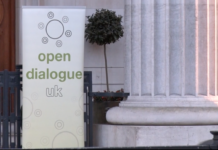Congress Proposes Research on the Link Between Psychiatric Drugs and Suicide
The meaning of veterans’ reactions to war is quite simple; they are trying to find a way to integrate the incredible horrors they’ve witnessed and to find a way to come back into a society that cannot possibly fully understand them. Drugging them into a stupor is not the answer. Congressman David Jolly (FL-13) has recently introduced the Veteran Suicide Prevention Act (H.R. 4640). The bill calls for the VA to study veteran suicides over the past five years and to determine what extent psychiatric drugs are implicated in those suicides. I encourage everyone to support Mr. Jolly’s bill by writing or calling your congressional representatives and encouraging them to cosponsor the bill.
The Experiential Democracy Project: A Depth Approach to the Legislative Process
The basic idea of the experiential democracy project is to supplement conventional legislative or other forms of diplomatic and moral deliberation with person-centered (“I-Thou”) principles of encounter. These principles, which derive from existential-humanistic psychology and person-centered therapy, stress the attempt to engage participants to more intimately understand each other, and through this context to more intimately understand each other’s often conflicting positions on issues of moral import.
Call to Action: Massachusetts Benzodiazepine Bill is Going to Committee
The Massachusetts Benzo Bill H4062: Informed consent for benzodiazepines and non-benzodiazepine hypnotics was just scheduled to be heard by the Joint Committee on Mental Health and Substance Abuse on Monday, April 4th. Less than a week away! The committee will decide whether the bill moves forward to the house and senate, goes to study, or is denied.
In Search of an Evidence-based Role for Psychiatry
A dilemma for all of us who are struggling to broaden our understanding of human distress beyond simplistic, pessimistic, bio-genetic ideology, and to improve our mental health services accordingly, is whether or not to soften our criticisms of psychiatry in the hope of reaching those psychiatrists whose minds are not totally closed. But doing so rests on the assumption that change can come from within the profession. For the last few decades examples of that are few and far between.
My Shock Survivor Story
I don't usually talk about this much because it's still somewhat traumatizing. I don't really do advocacy around shock treatment because it still triggers too much stuff. But this is a modern day advanced story of medical harms and misinformation, and you should comment on the FDA ruling.
Doctor O’s Adventures in Wonderland
I am a female physician who survived my own suicide attempt. I had managed to fly under the radar as a very progressive family MD for twenty years. And when I stumbled and bled, the sharks were there ready to devour the carcass. Do I believe that racism and sexism influenced charges being filed against me? I certainly do.
Only 72 Hours Left to Say #FDAStopTheShockDevice
As part of the effort to stop the down-classification of the shock device, on March 24, 2016, people who are psychiatric survivors, shock survivors, allies, and MindFreedom International members sent a 47-page public complaint to the FDA Ombudsman Office and Medical Devices Ombudsman concerning the FDA's attempts at down-classifying the shock device. Here are some excerpts. Please sign the petition and add your support to our growing strength!
Trinkets and Lunches and Dollars for Docs Really Do Pay Off
Mad in America readers will not be astonished by the news that Big PhRMA showers physicians with “free” trinkets and samples and lunches and dinners and junkets and dollars. Such tactics are common throughout the world of commerce, where they are described by terms ranging from “promotion” to “commercial bribery.” But do bribe-like actions ensnare physicians?
Do 5 Million Americans Really Have Bipolar Disorder?
5.7 million Americans say they have "Bipolar Disorder." These patients have been labeled, categorized, and offered an understanding of themselves as diseased, sick, and permanently broken. It is considered one of the more severe "mental illnesses," perhaps because it presents almost as an amalgamation of psychosis and depression in a particularly volatile form. In my training, I was taught to medicate these patients, often with multiple medications, and often against their will. Poetically, though, these patients — desperate to understand who they are in a system that condemns them to a life of struggle and suffering — will be vindicated by modern science.
Allen Frances on Anti-Psychiatry
On February 22, Allen Frances, MD, published an article titled Psychiatry and Anti-Psychiatry on the HuffPost Blog. The general theme of the article is that psychiatry may have some problems, but it is basically sound, wholesome, and necessary. The impression being conveyed here is that psychiatry's abandonment of a biopsychosocial approach and embracing of the brief med-check was the result of "drastic cuts in the funding of the mental health services." This is very misleading. The fact is that psychiatry set its own course when it jumped enthusiastically on the pharma bandwagon, and apart, from a miniscule minority who remained aloof from the drug-pushing, has made no attempt to alight.
Bridging the Benzo Divide: Iatrogenic Dependence and/or Addiction?
As the benzodiazepine crisis spreads throughout the United States and other parts of the world, so does the debate within the benzo victim/survivor community. We know that it can be terribly invalidating to label and treat a person as a “drug addict” who is only physically dependent on benzos — and taking these drugs exactly as prescribed by a doctor. However, it can be equally invalidating to deny that “iatrogenic benzo dependence” intersects in multiple ways in the lives of people struggling with “addiction.” People will ALSO SUFFER when yanked off of their benzos, or forced into similar rapid tapers when a doctor becomes aware of their addiction history.
Public Engagement Fail: Creating Community Solutions
Creating Community Solutions, part of the national mental health dialogue project, was started over four years ago to engage the public around mental health. It was based on a concept called deliberative democracy, where people who disagree with each other engage in dialogue to come to different solutions for a problem. However, for many reasons, this particular project only engaged with one part of the community. The chance to hear from the public was completely missed. Here is how that happened.
Comments on Jeffrey Lieberman and Ogi Ogas’ Wall Street Journal Article on the Genetics...
The March 3rd, 2016 edition of the Wall Street Journal featured an article by past President of the American Psychiatric Association (APA) Jeffrey Lieberman and his colleague, computational neuroscientist Ogi Ogas. The article was entitled “Genetics and Mental Illness—Let’s Not Get Carried Away.” In their piece, the authors started by expressing the belief that a recent study identified a gene that causes schizophrenia, and then discussed whether it is desirable or possible to remove allegedly pathological genes in the interest of creating a future “mentally perfect society.” The authors of the article, like many previous textbook authors, seem unfamiliar with the questionable “evidence” put forward by psychiatry as proof that its disorders are “highly heritable” In fact, DSM-5 Task Force Chair David Kupfer admitted that “we’re still waiting” for the discovery of “biological and genetic markers” for psychiatric disorders.
Medical Science Argues Against Forced Treatment Too
The argument that is usually made against involuntary commitment and forced treatment is that these actions, under the authority of a state, violate a person’s basic civil rights. They deprive a person of liberty and personal autonomy, and do so in the absence of a criminal charge. However, there is another argument, one of adjunctive value, that can be made against involuntary commitment and forced treatment. Medical science argues against forced treatment too.
“All for the Best of the Patient”
For psychiatric ‘help’ to happen by force is a paradox and makes absolutely no sense. It can destroy people's personality and self-confidence. It can lead, in the long run, to physical and psychological disability. My dear daughter Luise got caught in this ‘helping system’ by mistake, but she didn't make it out alive. I'm sad to say I later discovered that the way Luise was treated was more the rule than the exception.
Call To Action: Massachusetts Bill H4062 for Informed Benzodiazepine Use is Official
On February 24th, 2016 Bill HD4554 - An Act relative to benzodiazepines and non-benzodiazepine hypnotics was filed by Representative Paul McMurtry in the Massachusetts State House. The bill received 47 co-sponsors during the seven-day open period in which legislators can co-sponsor. This is an impressive and promising turnout.
Dr. Pies and Dr. Frances Make a Compelling Case that Their Profession is Doing...
Over the past two months, Ronald Pies and Allen Frances, in response to a post I had written, wrote several blogs that were meant to serve as an “evidence-based” defense of the long-term use of antipsychotics. As I read their pieces, I initially focused on that core argument they were presenting, but second time through, the aha moment arrived for me. Their blogs, when carefully parsed, make a compelling case that their profession, in their use of antipsychotics as a treatment for multiple psychotic disorders, has done great harm, and continues to do so today.
Life, Unarmed
When I was born, everyone was expecting me to have arms. The doctor's mind raced; how am I going to tell this mother and the father that their son has hands but not arms? If he's missing so much in his extremities, mustn’t he also be missing a mind? My mom looked into my eyes and knew - in a way that only mothers know - that I had a mind, and spirit.
Love is Dialogical: The Open Dialogue UK International Conference and Training
In the past five years, there has been a dramatic explosion of interest in the Open Dialogue Therapy practiced in Tornio, Finland. It is a humanistic “treatment” that has produced five-year outcomes for psychotic patients that are, by far, the best in the developed world, and there are now groups in the United States, Europe and beyond that are seeking to “import” this care. However, the challenges for doing so are many and, last month, Open Dialogue UK - on the occasion of the first-ever fully recognized Open Dialogue training outside of Tornio - organized a conference in London to hold an open dialogue about Open Dialogue.
TV Drug Ads, Abilify & Big Pharma Mobsters
Editors of even mainstream publications know that most of their readers hate TV drug ads, and so that’s why I could get the below piece published on AlterNet and then picked up by Salon. What’s most important to me in this piece—but which I did not “lede” with because I doubt that editors would have run it if I had is that: (1) Abilify was originally a drug for schizophrenia but has become a best-selling drug because it is now advertised as booster medication for antidepressants because antidepressants, as the Abilify commercial tells us, do not work for 2/3 of antidepressant users; and (2) Peter Gotzsche, in his book Deadly Medicines and Organized Crime, and Peter Rost, former vice president of marketing at Pfizer, equate Big Pharma with organized crime and the mob.
Myths are Used to Justify Depriving People Diagnosed as Mentally Ill of Their Human...
Despite the fact that no one in history, not even the omnipotent American Psychiatric Association -- which produces and profits mightily from the "Bible" of mental disorders -- has come up with a halfway good definition of "mental illness," and despite the fact that the process of creating and applying the labels of mental illness is unscientific, any of those labels can be used to deprive the person so labeled of their human rights. This is terrifying. It ought to terrify those who are so labeled and those who are not, because deprivation of human rights on totally arbitrary grounds is inhumane and immoral.
How Coalition or Community Engagement Work Damages Advocates
Have you ever tried to do community engagement or join a coalition of people working on mental health stuff? If you have been unhappy doing coalition work or community engagement, they may have said it was you. They may have complained that you were too demanding or too triggered by your trauma issues. But the problem is not on us as advocates. This is a structural problem. How do you keep the disease model people from dominating?
Getting Back to Dialogue – The Core of Healing!
When people are “mad,” they are often insisting that certain things are so, and frequently seem unwilling or incapable of appreciating or learning from other perspectives. Yet when the supposedly “sane” mental health system approaches those who are mad, it typically does the same thing – it insists that its own view of what’s going on is correct, and seems incapable of appreciating or learning from others, whether they be the patient, the family, former users of services, or anyone who understands madness in a different way.
Regarding the Impossibility of Recovery
Popular illness narratives tend to be of the restitution sort: I was living my life, I became sick, I got well and picked up where I left off. However, this idea that ill health is a journey to wellness doesn’t help someone with a chronic illness or disability to tell her own story, which may not have a (conventional) happy ending. The notion of ‘recovery’ can be damaging when a return to health may not be possible.
Has the FDA Abandoned Its Off-Label Promotion Ban?
On Tuesday, the FDA entered into a settlement agreement in Amarin Pharma v. U.S. Food & Drug Administration, allowing Amarin to promote a prescription drug for off-label use, so long as its promotion is truthful and non-misleading. The Amarin Settlement seems to be an abandonment by the federal government of protecting the public from off-label prescriptions. But these settlement were just the cost of doing business for the drug companies, while they continue rake in huge profits from the continued off-label prescribing of drugs, which does not diminish after the settlements. Of course, anything that is false or misleading is still grounds for charges, but that is a far harder case to make. I think the ban against off-label promotion is dead for all practical purposes.














